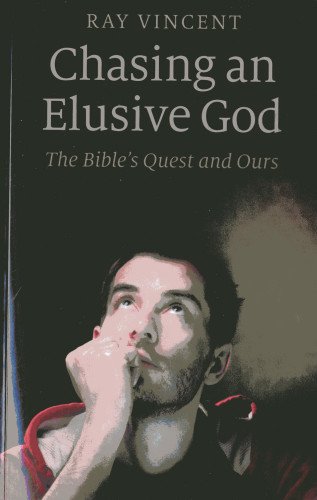Book review: Chasing an Elusive God
by Ray Vincent
★★★★★
This is the second book by Vincent that I’ve reviewed, and I enjoyed it as much as the first. Ray writes simply and draws on a lifetime of Biblical research. His approach is an even mix of informative and entertaining without coddling.
This book tackles the personal quest for God … a quest which repeats itself throughout the Bible. When we question our origin and cosmic purpose, trying to understand who or what God is and what he wants, we’re in good company. We see the same pondering throughout our holy book, from Genesis to Revelation. When we reach different conclusions than our neighbors, we’re again in good company, for the Bible’s authors hardly reached any consensus.
So Ray’s newest book is an exploration of the themes of a very human book: the Bible. From the mystery of the divine to the quest for meaning in life to the cry of the oppressed for justice to the emotions which rule us as human recipients to the great question of life after death, Ray journeys through what the Bible has to say—and not say—as the ancients struggle to make sense of the same questions we ponder today.
Ray sees the Bible as art, not history. That is what brings life to its pages. He explains with a comparison: “Van Gogh did not set out to inform us what sunflowers look like: a photograph or a botanical drawing could tell us that. What he did was to contemplate sunflowers, to open his heart to them, and to express in his painting the feeling they gave him. Because he did this we can look at that picture today, feel something of what he felt and see sunflowers, and perhaps the whole world, in a new way. That is what great art is about.”
Likewise, we must open ourselves up to the world of the Bible, its human struggles and dreams, in order to share in its journey.
Excellent reading! I can’t wait for Ray’s next work.
(Note: You can read the prologue here)












 354 Circles
354 Circles
 603 Goodreads Friends & Fans
603 Goodreads Friends & Fans

 Hello! I'm an author, historical Jesus scholar, book reviewer, and liberal Christian, which means I appreciate and attempt to exercise the humanitarian teachings of Jesus without getting hung up on any particular supernatural or religious beliefs.
The Bible is a magnificent book that has inspired and spiritually fed generations for thousands of years, and each new century seems to bring a deeper understanding of life’s purpose. This is true of not only Christianity; through the years, our age-old religions are slowly transforming from superstitious rituals into humanitarian philosophies. In short, we are growing up, and I am thrilled to be riding the wave.
I avidly read all thought-provoking religion titles. New authors: I'd love to read and review your book!
Hello! I'm an author, historical Jesus scholar, book reviewer, and liberal Christian, which means I appreciate and attempt to exercise the humanitarian teachings of Jesus without getting hung up on any particular supernatural or religious beliefs.
The Bible is a magnificent book that has inspired and spiritually fed generations for thousands of years, and each new century seems to bring a deeper understanding of life’s purpose. This is true of not only Christianity; through the years, our age-old religions are slowly transforming from superstitious rituals into humanitarian philosophies. In short, we are growing up, and I am thrilled to be riding the wave.
I avidly read all thought-provoking religion titles. New authors: I'd love to read and review your book!
 Hi! While Lee writes the articles and reviews the books, I edit, organize, and maintain the blog. The views expressed here are Lee's but I'm his biggest supporter! :-)
Hi! While Lee writes the articles and reviews the books, I edit, organize, and maintain the blog. The views expressed here are Lee's but I'm his biggest supporter! :-)
0 Comments
Trackbacks/Pingbacks